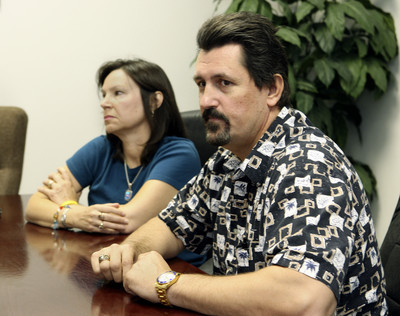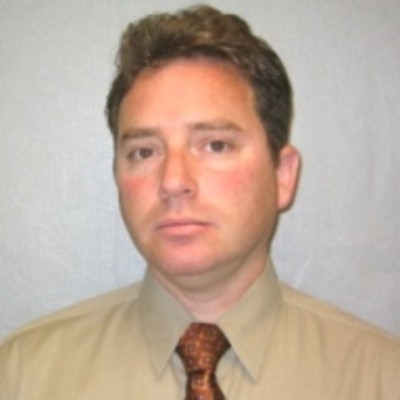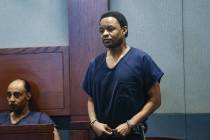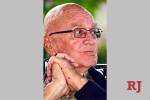Pharmacist says doctor didn’t spot colon cancer
Kevin Rexford understands that a key mission of the Nevada State Board of Medical Examiners -- to protect the public health from physicians not practicing medicine at the desired professional level -- can be painstaking work.
Often there can be conflicting judgments on whether a doctor handled a medical procedure or diagnosis properly.
Yet the 46-year-old pharmacist, who says a doctor at the Endoscopy Center of Southern Nevada missed his colon cancer in 2005 during a rushed colonoscopy, wishes there was more of a sense of urgency in the board's work.
Rexford settled a malpractice case with Dr. Clifford Carrol in March, which under state law requires a probe of the doctor by the board.
"I haven't received a phone call, a letter, nothing from the board," Rexford said.
Tony Clark, the board's executive director, said it follows the law "so you can assume" a file has been opened on Carrol. But Clark noted that cases go in order of priority.
"We have to go with what's really important," Clark said.
Carrol was a member of Dr. Dipak Desai's Shadow Lane endoscopy center health care team in February when authorities advised thousands of clinic patients to undergo testing for hepatitis and HIV.
Authorities investigating a cluster of hepatitis C cases had observed clinic nurses reusing syringes in a manner that contaminated vials of medication and, they believe, infected patients.
The practice was done at the direction of Desai and other administrators, according to city investigators.
Two of the 14 physicians who worked at the clinics associated with the hepatitis outbreak -- Desai and Dr. Eladio Carrera -- have had their licenses temporarily suspended by the board.
Clark has said there has not been enough evidence to take board action against other physicians at the Desai clinics.
To Rexford, his case should be of particular interest to investigators because it may expose another area of concern at Desai clinics: whether cancers were missed in screenings.
Expert witnesses in Rexford's malpractice case, including Drs. Arnold Wax and Russell Yang, said they believe a board investigation into Carrol should be a high priority.
When a physician settles a malpractice case, both the doctor and the insurance carrier must report the settlement within 45 days. Then, the medical board "shall conduct an investigation to determine whether to impose disciplinary action against the physician."
Yang, a professor at the Keck School of Medicine at the University of Southern California, said in his report on Rexford's case that Carrol's actual exam of Rexford's six to eight feet of colon lasted three minutes instead of the recommended six to eight minutes.
Yang noted that Carrol said in his deposition that he often performed more than 30 and up to 50 colonoscopies in one day and that no one ever monitored his work for quality.
"With the undue pressure to perform these many procedures by an individual physician in a single day, patients are unnecessarily exposed to procedural risks including missed diagnosis," Yang wrote.
Patients have previously told the Review-Journal about crowded conditions in the endoscopy center, and health care professionals who have worked with Desai in the past also described hasty colonoscopies by him.
Wax, a cancer specialist, said recently that Rexford's case should sound an alarm to insurance companies who paid for colonoscopies at Desai's clinics.
"As part of their quality assurance programs, they should be looking at individuals who had negative colonoscopies there and got cancer subsequently," he said.
The same should be done with those who had upper endoscopic procedures, he said.
What is of concern, he said, is that the procedures done at Desai's clinics involve "visual inspections" by physicians.
"If you're doing procedures too quickly, you can't see what you need to see," Wax said.
Desai's attorney, Richard Wright, refused to comment.
Reached recently, Carrol said in a brief conversation he did not know why the Review-Journal was inquiring about Rexford's case.
"That's all been settled," he said.
Deadly diagnosis
Rexford has already lived longer than his physicians predicted, but his colon cancer has metastasized to his liver and abdominal wall.
According to medical experts hired to review the case, Rexford would have had better than an 80 percent chance of survival after five years if his cancer had been caught during his colonoscopy. Now he has a 10 percent chance.
Rexford was diagnosed with a deadly stage of cancer a year after Carrol's colonoscopy found no trace of the disease.
Before settling the case, Carrol testified in a deposition that Rexford could have contracted the cancer after the colonoscopy.
Sources said the settlement was for $2 million.
There are indications the board will take the case as seriously as Rexford wants it to, but it could take nearly a year.
Van Heflin, recently appointed by Gov. Jim Gibbons as a public member of the board, said investigations can take from days to years, depending on the threat to Nevadans.
If the board felt a physician's conduct placed the public in a high-risk situation, action would be taken immediately, Heflin said.
There are other cases, he said, in which the board may have to look at several incidents in a physician's background before making a decision.
"There is just no set timetable. It all depends on the gravity of the situation."
A former board member who served on an investigative committee said because of the amount of Rexford's settlement he expects the board will investigate.
Settlements in the thousands, he said, often don't attract much investigative attention.
The former board member said most investigations of big malpractice settlements take about nine months or a little longer.
Although malpractice settlements are reported to the board and an investigation is opened, both Heflin and the former board member suggested that Rexford also file a formal complaint concerning his situation.
"It helps the board take it seriously," the former board member said.
Rexford said he expects to file a complaint to move the investigative process along.
"I just haven't really felt up to it," he said.
Clark, who said he can't comment on the timetable of a specific investigation, has repeatedly noted that a number of investigators are probing the role of physicians at the clinics where Desai was majority owner.
The board has seven investigators.
Rexford also said investigators may be interested to know that his medical records showed billing for 31 minutes of anesthesia for a procedure that Yang testified took a total of eight minutes.
Anesthesia is billed to insurance companies in 15 minute increments.
If an exam goes one minute over the 15 minute increment, then the facility can bill an extra 15 minutes.
Afraid of dying
Rexford said he doesn't know how much time he has left to live.
"I have good days and bad days," he said recently as he sat with his wife, Julie, and his attorney, Dan Carvalho, at his Assist Care Pharmacy headquarters.
He now has more than 200 pounds filling out his 6-foot-4-inch frame.
"He's become as thin as a rail, though, from the chemo," Julie Rexford said.
Rexford admits he sometimes finds himself afraid of dying.
"I want to see my girls grow up," he said. "This is not an easy thing to go through. It really is hell on earth."
Rexford said he wishes Carrol would have "said something" when he learned his prognosis.
"It would have meant something to me that he really cared," Rexford said.
"He (Rexford) never came back to the office," Carrol said, declining to answer further questions about the case.
The drugs that are keeping Rexford alive often make him suffer from diarrhea and nausea. Sometimes, mouth sores from the drugs make it impossible for him to eat.
And his fatigue often makes it difficult for him to walk across the room.
At times, his condition means Rexford can't run his business.
"I've got a good staff, though. That helps out."
Over the past three years he has seen his hair fall out and grow back. But the incurable cancer diagnosis of his doctors has never changed.
His wife said their daughters, 13-year-old Alexa and 12-year-old Hannah, can't help but cry sometimes late at night when the worry becomes too much.
"We just wonder how much time we're going to have left with him," Julie Rexford said.
Contact reporter Paul Harasim at pharasim@reviewjournal.com or 702-387-2908.

























